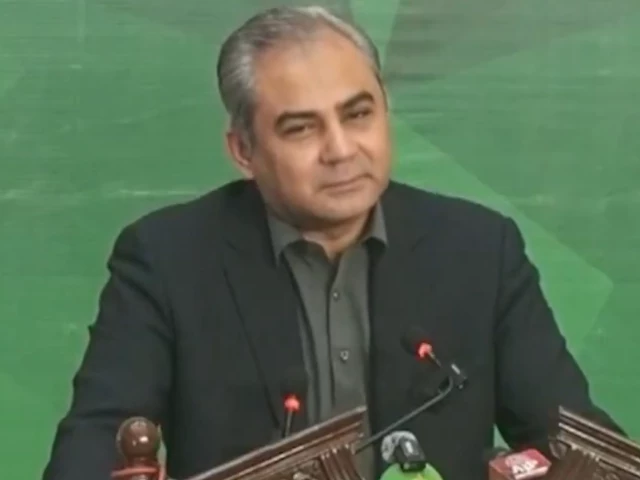Pakistan-India conflict once again brought intelligence agencies into the spotlight, as Interior Minister Mohsin Naqvi revealed they had advance knowledge of India’s war plans and even secured video evidence of six downed Indian jets. Speaking at a seminar in Lahore, Naqvi said Pakistan’s preparedness and unity turned the tide during one of the most serious escalations between the nuclear-armed rivals in decades.
Early access to Indian plans
Naqvi credited Pakistan’s intelligence network for playing a decisive role in the confrontation that followed the Pahalgam attack. He said agencies not only intercepted India’s operational documents but also obtained detailed information about its military strategies before they were executed.
“We knew every decision they made,” he told the audience. “From what aircraft they would use to when they would strike, every piece of intelligence reached us in advance.”
The minister emphasized that Pakistan delayed public announcements about the downing of Indian aircraft until video proof was obtained. “Within minutes of their jets being hit, we received footage confirming the destruction of six planes,” he said.
Six aircraft downed, including Rafale
The Pakistan Air Force (PAF) shot down six Indian aircraft during the exchange. Among them was a French-made Rafale fighter jet, marking the first time the aircraft had been destroyed in combat.
A senior French intelligence official later confirmed at least one Rafale loss, a development that caught international attention. Naqvi said the swift confirmation gave Pakistan’s narrative credibility at the global stage.
Missiles miss Pakistani base
Naqvi also attributed part of the outcome to divine protection. He said India fired seven missiles at a Pakistani base containing valuable assets, but none hit their target.
“Some missiles fell before reaching, some outside, and some to the side,” he said. “Everyone was worried, but not one missile landed inside. This was purely Allah’s help.”
In retaliation, Pakistan struck an Indian oil storage depot but deliberately avoided civilian areas. Naqvi said this demonstrated Pakistan’s restraint and responsibility despite facing heavy aggression.
Read: Pakistan floods kill 337 as residents blame officials for lack of warning
Military unity praised
The interior minister praised Pakistan’s military leadership, especially Field Marshal Syed Asim Munir, for ensuring joint coordination among the armed forces. According to him, for the first time, the Army, Air Force, and Navy operated under one plan.
He recalled Field Marshal Munir’s words to a visiting Saudi delegation: “India is like a shining Mercedes, but we are like a dumper truck loaded with stones. Imagine what happens when the two collide.”
Naqvi contrasted this unity with India’s command system, where he said service chiefs acted independently rather than under a coordinated strategy.
Political leadership stands united
The minister also highlighted the unusual political unity within Pakistan during the crisis. He said parties set aside differences and maintained constant communication to support the national stance.
“Our PPP Chairman outweighed India’s efforts in international lobbying,” he added, claiming that Pakistan’s political outreach proved stronger than New Delhi’s during the conflict.
Naqvi credited the Prime Minister and national leadership for withstanding international pressure. He said Pakistan’s decision to retaliate despite warnings showcased resilience and determination.
India’s internal drivers of escalation
Naqvi accused Indian leaders Ajit Doval and Amit Shah of masterminding the crisis. “These two men pushed India toward escalation,” he warned, adding that their actions risked damaging India’s long-term interests.
He further alleged that India used the war to suppress Kashmiris and continued sponsoring terrorism inside Pakistan, especially in Balochistan. According to him, the evidence pointed to a pattern of destabilization efforts aimed at weakening Pakistan internally.
Global and regional implications
The minister’s remarks reflected not only Pakistan’s military preparedness but also the risks of unchecked escalation between two nuclear-armed nations. The brief conflict led to civilian losses on both sides before diplomacy managed to cool tensions.
Naqvi’s emphasis on intelligence operations, political unity, and divine support underlined Pakistan’s narrative of resilience. He also warned that regional stability remains fragile as India’s leadership continues policies of confrontation.
The seminar, hosted by the Professor Waris Mir Foundation at Aiwan-e-Iqbal, also featured Senate Chairman Syed Yusuf Raza Gillani and Punjab Assembly Speaker Malik Muhammad Ahmad Khan, both of whom echoed the need for vigilance and national cohesion.
Follow us on Instagram, YouTube, Facebook,, X and TikTok for latest updates
